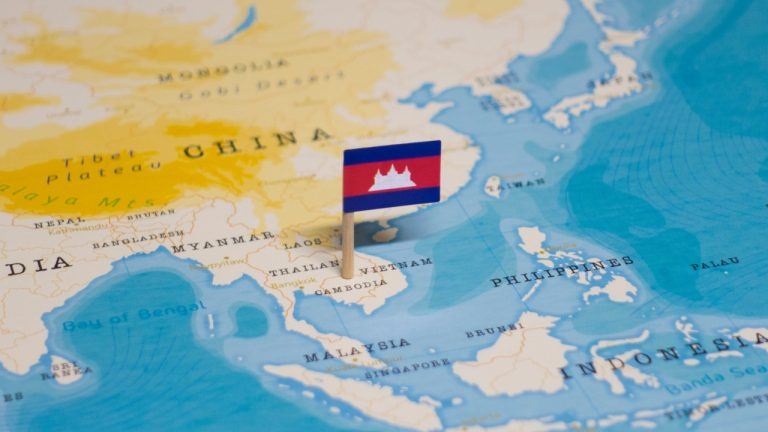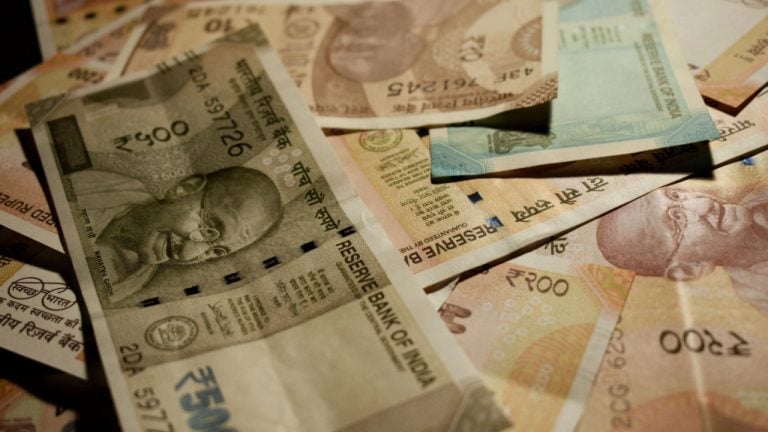 The National Bank of Cambodia (NBC) has issued new regulations on crypto-related activities. The directive, dated Dec. 26, mandates that individuals or entities involved in crypto asset transactions, such as fund mobilization, trading, and settlements, must obtain a license from the relevant authorities. Engaging in these activities without authorization may result in penalties under Cambodia’s […]
The National Bank of Cambodia (NBC) has issued new regulations on crypto-related activities. The directive, dated Dec. 26, mandates that individuals or entities involved in crypto asset transactions, such as fund mobilization, trading, and settlements, must obtain a license from the relevant authorities. Engaging in these activities without authorization may result in penalties under Cambodia’s […]

The Swiss-based backer of the Internet Computer Protocol will provide training and entrepreneurial support as well as decentralized computing.
Dfinity, the Swiss foundation behind the Internet Computer Protocol (ICP) blockchain, has signed a Letter of Intent (LOI) with the Cambodia Ministry of Industry, Science, Technology and Innovation at Token2049. The parties have agreed to pursue research, training and entrepreneurial ecosystem support for smart city infrastructure.
The definition of a smart city is somewhat nebulous but emphasizes the use of advanced information and communications technology. Dfinity already has a presence in Cambodia as a partner of a United Nations Development Program pilot project for its digital Universal Trusted Credentials system.
The LOI is part of Dfinity’s continuing efforts to support the sharing of sovereign cloud technology with governments and international organizations. Dfinity founder and chief scientist Dominic Williams said:
 The U.S. Department of the Treasury has imposed sanctions on Cambodian tycoon Ly Yong Phat and his businesses, linking them to human trafficking and forced labor scams involving cryptocurrency fraud. Victims were manipulated into online scam centers, and trafficked workers were forced into labor for these schemes. The sanctions freeze U.S.-based assets and prohibit transactions, […]
The U.S. Department of the Treasury has imposed sanctions on Cambodian tycoon Ly Yong Phat and his businesses, linking them to human trafficking and forced labor scams involving cryptocurrency fraud. Victims were manipulated into online scam centers, and trafficked workers were forced into labor for these schemes. The sanctions freeze U.S.-based assets and prohibit transactions, […]

The Cambodian central bank’s Soramitsu-backed digital payment system is continuing to expand.
The National Bank of Cambodia (NBC) has launched the Bakong Tourists app to extend visitors’ payment options through its blockchain-based Bakong payment system. The app will work within the Chinese UnionPay system and in Thailand, Vietnam and Laos, in addition to Cambodia.
There are only 55,000 point-of-sale (PoS) systems in Cambodia, a country with a population of 16.8 million. Credit cards cannot be used without a PoS, and there are only 5,600 ATMs in the country to provide cash. The Bakong app allows users to make purchases with QR codes at 3.3 million locations.
In addition to purchases, Bakong Tourists allows users to send and receive money, deposit funds into their bank accounts, track transactions and convert funds between US dollars and Cambodian riels. Bakong Tourists users will have a spending limit of $500 a day, which can be raised to $3,000 after the user undergoes Know Your Customer verification, which requires a photo and copy of the user’s passport.
 A major payments firm in Cambodia, Huione Pay, received over $150,000 in cryptocurrency from a digital wallet used by the North Korean hacking group Lazarus, according to blockchain data reviewed by Reuters. The crypto was sent to Huione Pay between June 2023 and February 2024 from a wallet linked to funds stolen from Atomic Wallet, […]
A major payments firm in Cambodia, Huione Pay, received over $150,000 in cryptocurrency from a digital wallet used by the North Korean hacking group Lazarus, according to blockchain data reviewed by Reuters. The crypto was sent to Huione Pay between June 2023 and February 2024 from a wallet linked to funds stolen from Atomic Wallet, […] The United Nations Development Programme (UNDP) has announced a partnership with the Dfinity Foundation to enhance its Universal Trusted Credentials (UTC) initiative. The collaboration aims to improve financial inclusion for micro, small and medium enterprises (MSME) globally using blockchain technology. UN Project Explores Digital Identity Solutions for MSME Financing The partnership will focus on developing […]
The United Nations Development Programme (UNDP) has announced a partnership with the Dfinity Foundation to enhance its Universal Trusted Credentials (UTC) initiative. The collaboration aims to improve financial inclusion for micro, small and medium enterprises (MSME) globally using blockchain technology. UN Project Explores Digital Identity Solutions for MSME Financing The partnership will focus on developing […]
The CBDC-like bakong provides digital payment services in riel and the U.S. dollar. It has been steadily extending its regional scope.
The bakong, a digital currency operated by the National Bank of Cambodia (NBC), will provide users with access to the Alipay merchant network and enable cross-border transactions on Alipay+ using QR codes under a memorandum of understanding (MoU) signed at the FinTech Expo in Singapore, the local press reported.
The bakong service operates by the NBC on a blockchain, but it is not a central bank digital currency (CBDC), as the currency is a liability of the commercial banks that use it. The bakong enables both United States dollar and Cambodian riel accounts. The Cambodian economy is heavily dollarized.
The MoU means that Cambodians will be able to use riel from their bakong wallets to shop with 83 million merchants worldwide on the Alipay network. In addition, Chinese tourists who have accounts with China’s massive Alipay electronic payment system will be able to shop in Cambodia using the QR codes of the bakong KHQR system. NBC governor Chea Serey said:
“The simplicity of making payments provides merchants with a revenue boost, helping to stimulate economic activity. I’m confident this collaboration with Alipay+ will be beneficial for all parties.”
There were 35.4 million transactions worth $12 billion using the bakong in the first half of 2023, the Phnom Penh Post reported on Nov. 17.
Related: Lao CBDC proof-of-concept project to launch using system pioneered in Cambodia
The bakong payment was launched in 2020 and was designed for sending remittances an making purchases. Its mobile app was developed in collaboration with Japan’s Soramitsu blockchain. In August, Soramitsu announced plans to use the bakong to develop a cross-border payment system encompassing India, China and Japan. The bakong is already used in Malaysia, Thailand and Vietnam.
Local vendors can now use the KHQR network of the Bakong system, a part of the National Bank of Cambodia (NBC), to make payments to over 80 million Alipay merchants globally.https://t.co/hLagrXU08X
— The Phnom Penh Post (@phnompenhpost) November 17, 2023
In July, the NBC signed a MoU with China’s UnionPay International on the use of QR codes for cross-border payments.
Magazine: China’s 180M digital yuan airdrop, Devastation in Turkey, Laos’ CBDC: Asia Express
 The leaders of 10 Southeast Asian nations, members of the Association of Southeast Asian Nations (ASEAN), have agreed to “encourage the use of local currencies for economic and financial transactions.” The group comprises Brunei, Cambodia, Indonesia, Laos, Malaysia, Myanmar, Philippines, Singapore, Thailand, and Vietnam. This move will help them reduce their reliance on the U.S. […]
The leaders of 10 Southeast Asian nations, members of the Association of Southeast Asian Nations (ASEAN), have agreed to “encourage the use of local currencies for economic and financial transactions.” The group comprises Brunei, Cambodia, Indonesia, Laos, Malaysia, Myanmar, Philippines, Singapore, Thailand, and Vietnam. This move will help them reduce their reliance on the U.S. […] The government of India has announced that it will facilitate the settlement of international transactions using its national currency, the rupee. As part of its foreign trading policy framework implemented on April 1, the country introduced this measure to facilitate payments for countries experiencing a U.S. dollar crush. India to Offer Rupee-Based Settlement Options for […]
The government of India has announced that it will facilitate the settlement of international transactions using its national currency, the rupee. As part of its foreign trading policy framework implemented on April 1, the country introduced this measure to facilitate payments for countries experiencing a U.S. dollar crush. India to Offer Rupee-Based Settlement Options for […]
Crypto exchange Binance has signed similar agreements with governments in Kazakhstan, Dubai and Bermuda.
Crypto exchange Binance has signed a memorandum of understanding (MoU) with the Securities and Exchange Regulator of Cambodia (SERC), according to a June 30 announcement.
Binance and SERC will work together to develop crypto regulations in the country. SERC is looking to leverage Binance’s technical expertise and experience in the field to develop its own legal framework for the digital asset market.
Cryptocurrencies are not regulated in Cambodia and any unlicensed activity involving these digital assets is highly prohibited. The partnership could prove pivotal for the South Asian nation where any crypto-linked activity is deemed illegal since 2018.
Asia has become a crypto hotspot over the years with several nations in the region adopting a pro-crypto approach. The likes of Thailand, Singapore, Malaysia, Philippines have come up with progressive regulations to promote the use of crypto assets in their respective countries.
Binance has paid special attention to good regulatory relations, especially after its 2021 debacle that saw nearly half a dozen countries issuing compliance warning against the crypto exchange. The leading crypto exchange has mended its relations since then and has forged critical partnerships in Asia over the past year in countries such as Thailand, Malaysia and Singapore.
The crypto exchange has also made a name for itself when it comes to offering technical expertise to governments about crypto and helping them with regulating the nascent sector, The exchange had signed a $15 million investment agreement in Bermuda to teach and educate the community about crypto.
Related: Binance U.S. makes BTC trading fee-free as competitors feel the heat
Binance’s regulatory in-roads in the emerging markets have caught the attention of many including the likes of Alex Gladstein, chief strategy officer at Human Rights Foundation. Gladstein lauded Binance’s recent expansion in emerging markets such as Asia, Africa, and the Middle East and said:
“While Western cryptocurrency companies are buying Superbowl ads and sports stadium rights, Binance is ruthlessly and custodial taking over emerging markets in Asia, Africa, the Middle East, and Latin America. They are winning.”
Earlier in May Binance signed a similar MoU with the government of Kazakhstan, to help them with crypto adoption and regulations. Similarly, it had signed an MoU with the Dubai World Trade Centre Authority (DWTCA) in December last year and later bagged a license to operate in the country as well.